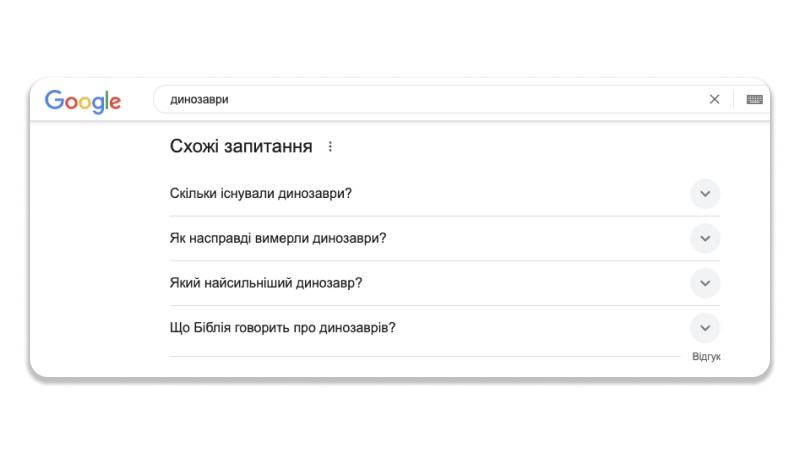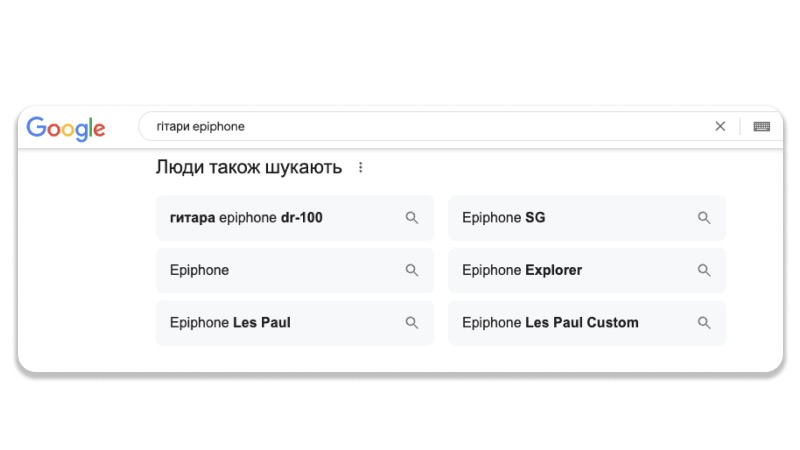Content of the article

«Similar Questions» and «People Also Search For» are unique free tools that can be integrated into your SEO strategy. WEDEX will tell you about these blocks and how you can use them to promote your website.
About Google and its algorithms
Google is known for its love of updates and major upgrades. The company’s main product, the Google search engine, is updated on a regular basis, adding new features for users and improving search algorithms.
On the other hand, each update brings some new requirements to the content. Some of these innovations are positive: the system scrutinizes the textual content of the site more closely, filters texts generated by AI, and the overall quality of content on the first page of SERPs improves
However, most of the changes are hidden from SEO specialists by a proprietary veil: we learn about some major updates only when the old promotion strategies stop working.
But the idea that Google does nothing but create problems for SEOs is not true. After all, it was Google that created two simple tools for working with semantics and built it right into the search page.
«Similar questions» and «People are also looking for»
The first thing that comes to mind when you think of «keyword tools» are services like Google Keyword Planner or tools like Ahrefs’ Keywords Explorer or SEMRush’s Organic Research. The Keyword Planner and Keywords Explorer are powerful solutions, but both services can be difficult to use – the interface can seem complicated and overwhelming.
Today, there are two tools from Google that can help with semantics, keyword research, and simply niche research. These tools are called «Similar Questions» and «People are also searching» and are located right on the main search page.
Similar questions
After entering a search query, the user is taken to the search results page. Among the links to texts and videos, advertisements, and pictures, the user can see a block called: «Similar Questions».
Usually, this block consists of a small number of results for similar queries. Here’s an example: after watching Jurassic Park, a user became interested in the topic of dinosaurs and went to search for information. Scrolling down a little below the first results, they will find a block with similar thematic queries.

You can click on each of the items and see the answer to the question, which links to a particular site. For the user, this block is useful because you can quickly see similar results on a related topic and explore the material in more detail.
For an SEO specialist, Similar Questions is one of the promotion tools. The questions in the block directly indicate what potential customers may be looking for and interested in. In addition, questions can also be used to generate new search queries and implement them into an SEO strategy.
People also search for | People Also Search For
The People Also Search For (PSAF) block has something in common with the Similar Questions. «People Also Search For» is displayed at the bottom of the SERP and includes similarly themed specific queries from users.

When you click on the corresponding query in the People are also looking for block, the user is redirected to a new search page with results based on the selected query. Some of these queries will not always match the original query, but they will help you understand what related topics users and potential customers may be interested in.
How to use «Similar Questions» and «People Also Search For» in SEO?
Both tools help to solve two urgent problems of any SEO specialist:
- tracking keywords, including new ones that have recently become keywords for a particular topic;
- improve understanding of user needs by analyzing similar queries.
The advantage of using queries from the People are also searching block in the formation of SEO texts is that Google is more likely to suggest your site to users who have used an irrelevant or only partially relevant query. You can also analyze the pages linked to in the «Related Topics» block. This will help you understand why Google considers this particular page relevant.
Order an SEO audit from WEDEX experts! We will identify your website's strengths and weaknesses and help you make it more relevant to Google and your customerDo you want your website to appear in search more often?
New ideas for SEO promotion
Analyzing both sets of questions and queries can provide new ideas for promotion. It is likely that not all queries and related topics have been explored within your site, so you should pay attention to this.
One of the most likely scenarios is to expand the topics of your blogs. For example, your website focuses on car repair. Analyzing search data will help you find related queries and create relevant content for your site.
Although the main topic of the site remains related to complex car repairs by professionals, the blog may include articles such as «Step-by-step instructions for changing the oil», «How to choose engine oil,» or «Car maintenance tables.» This approach will help drive more relevant traffic to your website.
Prioritizing content
Analyzing queries from People Also Search For can also be used to create content plans. Using services such as Keyword Overview, you can find out which of these related queries is more relevant.
Using parameters such as search volumes, keyword variations, keyword complexity, additional questions, and others, you can create not only useful but also optimized content.
Optimize existing content
You can also reach more users by adding the keywords and queries you find to your existing content. For example, a website already has a large and successful article on computer maintenance. For better search engine optimization, you can add new search terms to it, add a new section focused on new keys, and so on.
The main thing is to make the page and the text on it look natural. If the derivative article no longer needs to be supplemented, it is better to implement a link to a new article in the body of the text, which will be written with new requests in mind.
Use the «Similar Questions» to create a FAQ on your website
Another original option is to use «Similar Questions» on the FAQ page of your website. The logic is the same as when you optimize your existing content – use new keys and related queries, but do it in a more natural way.
This will not only help the page ranking, but will also bring practical benefits to users, as they will have a complete guide to your business, services, terms of return, cooperation, etc. Besides, you can attract a lot of new customers with just one page.
We recommend creating a FAQ section based on the actual keyword density and not over-optimizing it. This way, Google will be able to index the page properly, and there should be no problems with its ranking in the SERP.
Link building with requests and questions
We have already suggested the option of using queries in the form of links to the relevant article. This is also a part of the SEO strategy and helps to organize link building. Try to form not only the article you are linking to, but also the text of the link itself, taking into account the queries.
This strategy works on several fronts at once:
- expanding the existing semantic core of the site;
- allows you to use more thematic anchor links;
- increases the relevance of content for Google and its search robots.
Competitor analysis
Another opportunity that opens up with the use of queries from Similar Questions or People are also looking for is competitor analysis. If a competitor is included in the «Similar Questions» results, it’s a sign that you should take a closer look at their promotion strategy. Find out more about the keywords used by your competitor, the structure and frequency of content on their website, and how they attract potential customers.
Conclusions
«Similar Question» and «People Also Search For» are powerful, and most importantly, free tools for improving your website’s SEO strategy. They will help every SEO specialist with:
- searching for keywords and then using them;
- understanding the «pain» of customers – and solving it in the form of content and encouraging cooperation;
- improving the content – you should make it not only high-quality and focused on promotion to higher SERP positions, but also useful;
- link building and building a working link network;
- new ideas – look for new ideas for content and promotion among user requests and questions.
If you add other search query analysis tools to the «Similar Questions» and «People Also Search For» blocks, the results can exceed all expectations. Stay with WEDEX and learn about other useful online marketing tools!






 21/03/2025
21/03/2025  3024
3024



